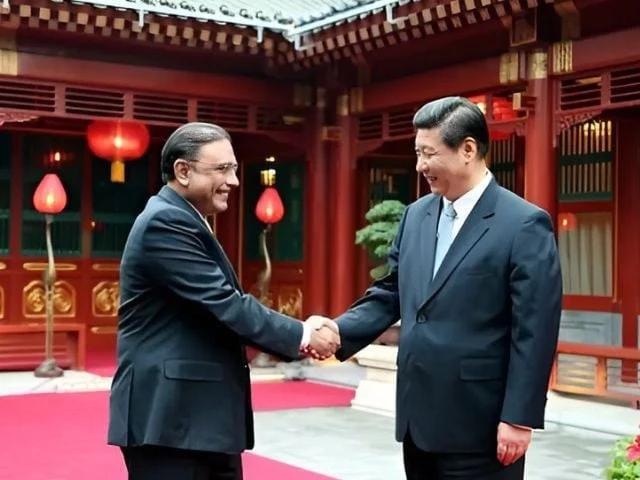What does Zardari's China visit mean for Pakistan?
Strategic partnerships, economic revival, and security cooperation take centre stage

President Asif Zardari visited China at the invitation of President Xi Jinping. He visited at a critical moment in history as Pakistan is facing multiple complex challenges. On one hand, the economy struggles to recover amid skewed opportunities, and the GDP growth rate remains low. The financial crisis has plagued Pakistan for a long time and presents various dimensions. On the other hand, climate change-related disasters have become regular occurrences. Pakistan continues to grapple with the impacts of the 2022 flood and is now facing the threat of drought in 2025.
In recent years, terrorism has begun to resurface, particularly following the abrupt withdrawal of US forces from Afghanistan. Terrorist groups are collaborating closely with anti-Pakistan forces and are targeting the China-Pakistan Economic Corridor (CPEC) and Chinese nationals. It has threatened the hard-earned peace and security. Additionally, political instability is affecting Pakistan. The ruling elite have failed to demonstrate any maturity in resolving their differences and restoring stability to the country. They seem unable to understand that the economy cannot progress without stability, leaving all other sectors stalled.
In this context, Pakistan is seeking options and partnerships to revive its economy, restore financial stability, counter terrorism, ensure security, and combat the impacts of climate change. It is good to note that President Zardari's visit was focused on these areas. In pursuit of this agenda, President Zardari met with President Xi, Prime Minister Li Qiang, and others. The leadership of both countries deliberated on Pakistan-China relations, with a particular focus on economic and trade cooperation, counter-terrorism and security collaboration, the CPEC, and future connectivity initiatives. China's top leadership assured President Zardari that China would try to help Pakistan overcome its challenges and enhance bilateral relations.
However, the real work will begin after the visit. Pakistan must focus on three key areas to implement the agreements and fully capitalise on China's opportunities. First, it needs to transform its business and investment environment. There's no need to elaborate on the current state of the business environment; it is widely acknowledged as highly inefficient, with time-consuming processes and deep-rooted corruption. The self-serving behaviour of the ruling elite exacerbates the situation. Additionally, the culture of subsidies and preferential treatment for selected business groups is equally harmful. Pakistan established the Special Investment Facilitation Council (SIFC), but it still struggles to achieve its intended objectives. Among other challenges, a lack of authority to make and implement decisions, coupled with limited capacity, presents significant hurdles to achieving those goals.
Therefore, Pakistan must work to create a business and investment system that is efficient, free of corruption, and less time-consuming. Efforts should also focus on reducing the influence of the ruling elite and curbing rent-seeking behaviour. The government should empower the SIFC by bringing in professionals capable of developing feasibility studies and implementation frameworks. Each desk at the SIFC (China desk, Gulf desk, etc.) should be staffed with experts who understand the specific country or region. Staffing should not be generic or mediocre.
Additionally, Pakistan must think beyond just a few rules and processes, incorporating better living conditions into the definition of a business environment. Enhancing the living conditions for investors and their families is equally important as developing appropriate regulations and procedures. For instance, a few days ago, Volker from Germany brought up this issue in a meeting focused on investment in Pakistan. He asserted that when an investor or their team considers investing in a country, they also evaluate the living conditions, services, and facilities, such as education, healthcare, recreational opportunities, and more.
Without a sound business and investment environment, Pakistan will not be able to fully capitalise on the opportunities presented by China and CPEC. This argument can be strengthened by examining the performance of the past 11 years. Many of the Special Economic Zones (SEZs), which were anticipated to be fully operational, are still in the early stages of development. Currently, there are only two operational SEZs, which are also not running at full capacity. Agricultural cooperation has not achieved the desired results. Thus, the business environment should be one of the top priorities.
Second, security is critical in building a business and investment-friendly environment, ensuring the smooth execution of CPEC, and reaping its full benefits. It is also required to create better living conditions. I have written extensively on this subject, so I will not deliberate more on this. However, I will reiterate that without improving security, Pakistan will not be able to benefit from the opportunities offered by China and CPEC. As President Xi has said, our cooperation in the security and economic fields reinforces each other, and the two wheels must be advanced simultaneously. A safe and stable environment is indispensable for China-Pakistan's practical cooperation, including the construction of CPEC. It is good to note that the interior ministers of both countries deliberated and agreed to enhance security cooperation to ensure the safety and security of Chinese nationals and CPEC investments. However, we will have to wait for the implementation.
Third, the right choices should be made, and cooperation should be prioritised based on ground realities and situations. For example, Pakistan is struggling to enhance exports. China has offered Pakistan multiple opportunities to increase exports. China and Pakistan have also signed a free trade agreement to enhance trade. Pakistan can benefit from these opportunities by identifying the right products and commodities for export based on Pakistan's comparative advantage and Chinese needs. Market analysis of China indicates that imports of agriculture, food, meat, and dairy products are on the rise.
Fortunately, Pakistan has the capacity and comparative advantage to export agricultural and food products to China. Pakistan can export high-quality meat, dairy products, and fresh vegetables and fruits. The close vicinity further enhances the advantage. Pakistan can even export products by road, and it will take only a few days.
Unfortunately, Pakistan is still unable to benefit from the Chinese agriculture and food market. Pakistan's exports to China are only a few million dollars, except for rice (billions). The country could earn billions of dollars every year by exporting agricultural products. For example, Pakistani mangoes, meat, and dairy products have a good market in China. The major impediments to this are the low priority of the sector, government negligence, and failure to meet sanitary and phytosanitary standards.
Fourth, the Pakistani system does not have many people who understand the Chinese governance, economic, and environmental system. The Chinese system is quite different from the liberal system. Pakistan has a majority of people who have studied under the liberal system and worked within it. They try to understand the Chinese system through the lens of the liberal system. It's like trying to understand football with the rules of cricket. This slows the pace of the implementation of agreements and cooperation mechanisms. For example, Pakistan has signed many MoUs with China, but many of them have yet to be implemented. Thus, Pakistan must work on recruiting people who have a good understanding of Chinese systems. Fortunately, in the recent past, many young Pakistanis have graduated from China.
In conclusion, to fully exploit the potential of CPEC and the opportunities offered by the Chinese market, Pakistan will need to transform its business and investment system and provide fool-proof security. More importantly, Pakistan must move beyond rhetoric and focus on practical actions because actions matter, not rhetoric.
THE WRITER IS A POLITICAL ECONOMIST AND A VISITING RESEARCH FELLOW AT HEBEI UNIVERSITY, CHINA



















COMMENTS
Comments are moderated and generally will be posted if they are on-topic and not abusive.
For more information, please see our Comments FAQ